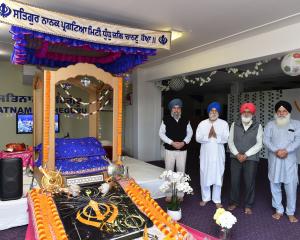The system, set up to encourage people to share rides to the area, may soon be available to fewer people, at a cost, and with increased monitoring to deal with the problem.
The Dunedin City Council will be asked to consider the issue at a finance, strategy and development committee meeting on Monday, when a report by acting transportation planning manager Sarah Connolly is tabled.
Ms Connolly said yesterday that while the system had its flaws, it was "ground-breaking" and should be retained.
The ride-share scheme, which has been in place since 2000, has 153 on-street parking spaces open to staff and students at the University of Otago and the Otago Polytechnic.
Ms Connolly said the objectives of the scheme included improved options for commuters, a reduced number of single-occupant vehicles, which helped reduce emissions, and reduced parking pressure.
People who wanted to use the system had to register, and were provided with tokens.
To park free in one of the ride-share spaces, two tokens, at least, had to be placed inside the windscreen of the car to indicate two people had commuted.
But in October last year, a council employee had surveyed the scheme by watching drivers as they parked, and found in 41% of cases the cars had two tokens, but only one occupant.
The employee had to be "subtle" in her work, Ms Connolly said. If drivers saw a parking officer checking the vehicles, they were inclined to do circuits of the block until they left.
In her report, she said that apart from abuse of the scheme, the cost to the council was $50,000 a year, though income was generated by infringement notices, meaning the net cost was closer to $20,000.
Ms Connolly said the scheme was inequitable in its current form - while staff at tertiary institutions could use it, staff at other organisations could not.
The preferred option for councillors on Monday was to retain the scheme, but introduce a $50-a-year fee, limit it to students only, and do more to monitor abuse.
Abuse should decline if the fee was introduced, and the fee would provide revenue to help cover the cost.
Ending staff access would be offset by the increase in parking options provided for them by the tertiary institutions, and the $5-a-day parking that had been introduced in North Dunedin.
Ms Connolly said yesterday she hoped that in future, the scheme could be introduced for institutions citywide, although that was unlikely to happen soon.












